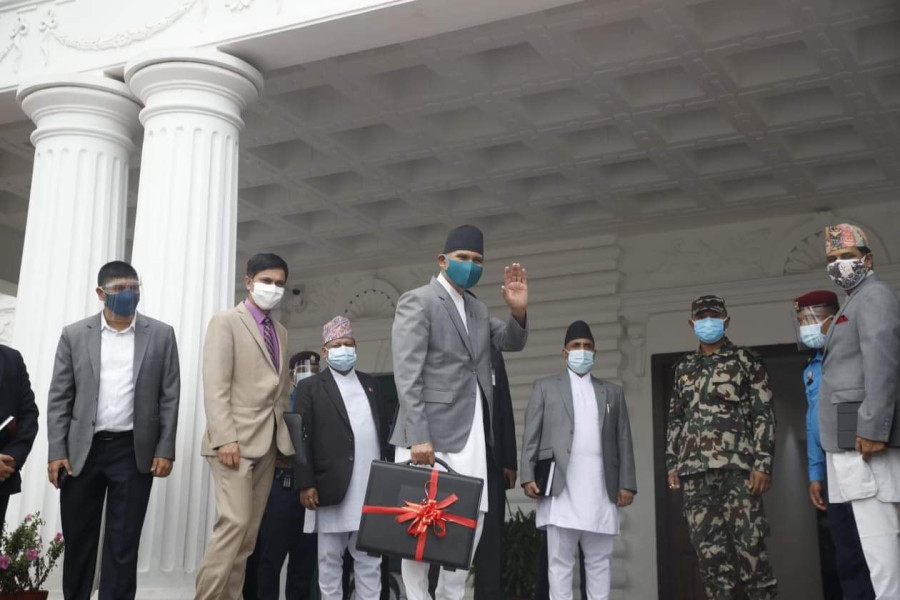Editorial
All bark and no bite
Reflecting on the government that announced it, Budget 2021-22 is bound to be unimplementable.
Nepal is still in the middle of a deadly second wave of the SARS-CoV-2 pandemic that continues to kill over 100 Nepalis every day. The current lockdown, initiated to cut viral transmission, has affected businesses and livelihoods. Particularly, the current extended restrictions have been criticised for forcing people into panic buying supplies while being myopic towards the needs and purchasing capacity of the poor.
In spite of all this, the current caretaker government has brought out a bloated and unnecessary budget that obviously looks forward more to the planned November elections than to the task at hand—saving lives and reviving the economy. In the present context, where Parliament is dissolved and there are questions as to whether the government is legitimate given the majority support in the now-dissolved House for a Nepali Congress-led government, the Oli administration had no constitutional obligation to release a full budget. With a public health crisis playing out, releasing a shorter, targeted fiscal plan would have been appropriate.
Some sections of the budget may turn out to be prudent policy measures. Income tax incentives to start-ups and small businesses make sense, given the restrictions affecting business. So do VAT exemptions for logistics, transport and infant formula, given their potential trickle-down effects to consumers who are also feeling the brunt of the novel coronavirus and lockdown measures. But even these will only be effective if implemented well.
For the most part, though, the policies announced are populist measures meant to pull back a voter base that is increasingly rejecting KP Oli and his failing stint at the helm. For example, the government has announced salary hikes for its employees, and has mentioned increased social security and income for certain groups of teachers. But while doing so may boost consumer spending and sustain public employment, this government has done very little to boost school enrolment and better the education infrastructure. With institutions closing for another lockdown, public schools still do not have plans to implement long-term improvements that will boost learning, whether physical or remote.
Finance Minister Bishnu Poudel announced the elimination of excise duties and reduction of custom duties on electric vehicles. A welcome reversal from Yuba Raj Khatiwada’s tenure at the treasury, this will boost mass adoption of electric vehicles in the coming years and lead to a reduction in air pollution. However, with the country facing a major economic crisis, this is again a policy measure that was not a priority, given the severe inadequacies faced by the country which needs immediate respite.
In fact, the budget reflected the Oli-led government’s tenure—full of exaggerated promises and lacking delivery. Much like Khatiwada's announcement of an unbelievably optimistic 7 percent growth rate in the last fiscal year (declared, just like this year, in the middle of a lockdown), Poudel has announced an expected year-on-year rate of 6.5 percent. The finance minister seems to have forgotten that Nepal experienced negative growth in 2019-20 and is on course to a misleading growth of about 4 percent in 2020-21, despite Khatiwada’s cheerful predictions.
Indeed, we only need to look at the last budget’s failures to predict what will come this next fiscal. For, sensing that the pandemic in May 2020 had not shown its worst outcome, the government then had prioritised an urgent health infrastructure development plan that promised to build 200 new hospitals at all local levels and special healthcare facilities to accommodate infectious diseases, with Kathmandu getting a new centre with 250 ICU beds, and each provincial capital getting centres with 50 ICU beds each. It must be noted that, one year on, all these promised beds are yet to become operational. Instead, in what seems to be an ill-thought-out image-building exercise, Poudel announced a free medical treatment scheme for journalists.
If the government had focused on fulfilling last year's promises, Nepal would have had more care units during this second wave, when people began desperately looking for oxygen canisters and ICU beds. Perhaps then, it could have gained voter support without resorting to populist measures.




 13.12°C Kathmandu
13.12°C Kathmandu














